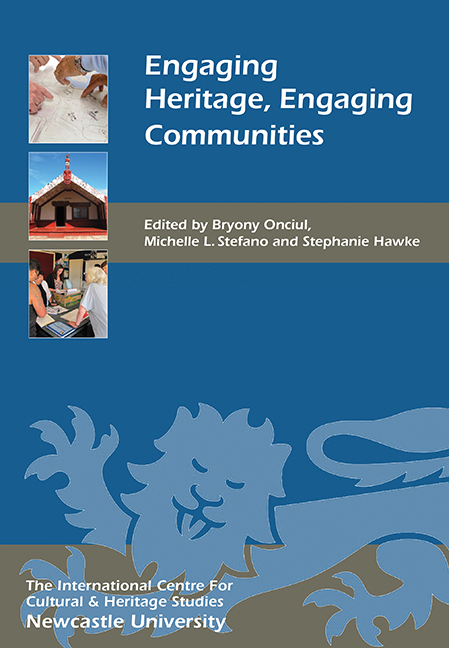Book contents
- Frontmatter
- Contents
- List of Illustrations
- Acknowledgments
- Introduction
- Engaging Concepts
- 1 The Gate in the Wall: Beyond Happiness-making in Museums
- 2 Assembling Communities: Curatorial Practices, Material Cultures and Meanings
- 3 Interview – John Tunbridge
- 4 Interview – Gregory Ashworth
- 5 Engaging with Māori and Archaeologists: Heritage Theory and Practice in Āotearoa New Zealand
- 6 Horizontality: Tactical Politics for Participation and Museums
- Engaging Creatively
- Engaging Challenges
- List of Contributors
- Index
- Miscellaneous Endmatter
5 - Engaging with Māori and Archaeologists: Heritage Theory and Practice in Āotearoa New Zealand
from Engaging Concepts
Published online by Cambridge University Press: 13 April 2017
- Frontmatter
- Contents
- List of Illustrations
- Acknowledgments
- Introduction
- Engaging Concepts
- 1 The Gate in the Wall: Beyond Happiness-making in Museums
- 2 Assembling Communities: Curatorial Practices, Material Cultures and Meanings
- 3 Interview – John Tunbridge
- 4 Interview – Gregory Ashworth
- 5 Engaging with Māori and Archaeologists: Heritage Theory and Practice in Āotearoa New Zealand
- 6 Horizontality: Tactical Politics for Participation and Museums
- Engaging Creatively
- Engaging Challenges
- List of Contributors
- Index
- Miscellaneous Endmatter
Summary
Understanding what heritage means to community groups is an essential prerequisite for active, creative and successful engagement with them. Heritage is a cultural construct comprising different ideological and material phenomena for diverse groups of people, which means there are innumerable possible heritages, each shaped for the specific user group. However, although there may be an infinite variety of possible heritages, in New Zealand, for example, the dominant Western discourse controls the development of independent heritages. This chapter provides evidence of two different ‘heritages’ and identifies key principles about heritage. A view of heritage has emerged since 2011 that reflects the Māori world, but which is equally applicable to the archaeological world, and can be extrapolated to wider society and other communities. The Iwi Heritage Discourse describes the practice of heritage as ‘ahi kā’ – in other words, keeping the home fires burning or keeping a place warm through the many ways of using it: visiting, farming, ‘being there’, making the Connect, kaitiakitanga (Royal 2015).
COMMUNITY
A warning must be given against the uncritical and undefined use of the word ‘community’, which is endemic in the heritage sector to the point that it has been described as ‘the cult of the community’ (McClanagan 2007, cited in Smith and Waterton 2009, 21). Communities are not homogeneous but heterogeneous, and often not even geographically bound; there are ‘communities’ of archaeologists just as there are village ‘communities’. The ‘community’ is, however, relegated to a role in relation to its perceived identity as ‘not expert’, and many of the tensions that arise between expert and community arise from their respective abilities to define and influence heritage values, meanings and experiences (Smith and Waterton 2009, 21–2).
METHODOLOGY
This research used an interdisciplinary theoretical framework developed from the literature of heritage studies and related fields. It builds on Laurajane Smith's work on archaeology and the authorised heritage discourse but includes writing on governmentality, phenomenology, kinaesthesia, agency and material culture. A qualitative, interpretivist methodology was used which involved discourse analysis of evidence gathered from secondary sources including legislation and policy and an ethnography of current practice in the form of interviews and participant observation to produce rich findings about heritage, place and practice.
- Type
- Chapter
- Information
- Engaging Heritage, Engaging Communities , pp. 55 - 72Publisher: Boydell & BrewerPrint publication year: 2017



